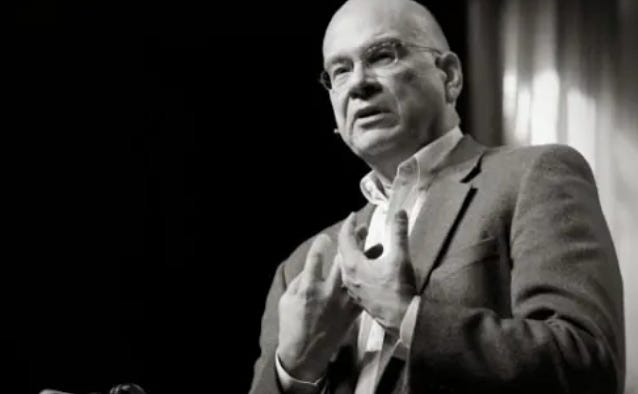The Troubling Legacy of Tim Keller
It is not unloving nor hypocritical to say that we are praying for comfort for Tim Keller’s family and church, and at the same time striving for clarity and open discussion regarding his teaching, which will endure in his absence. Those who reflexively claim it is unloving or inappropriate to criticize him in the wake of his passing are content to let doctrinal clarity be subjugated to personality and “respectability.” We are not.
It should first be noted, especially since he has received the praise of so many should-be hated by the world believers, that Keller was not by any definition hated by the world (John 15:18). Rather, the world embraced him as one of their own. Nearly every “respectable” publication – from The New York Times to Christianity Today – wrote fawning pieces on Keller’s passing, holding him up as the modern example of how to bridge the gap between Christianity and a world that, according to scripture, wants no part of the true Christ (John 15:18-19). Keller’s bridge was built smack dab between the church and the depraved culture, undergirded by a synthetic gate of orthodox terminology and faux-intellectual (often nonsensical) doublespeak wide enough to drive a New York City garbage truck through.
Keller’s pragmatic winsomeness and pseudo-erudite nuance garnered a great deal of influence with spiritually immature seminary students (1 Cor. 3:1-2) and Calvinist-leaning pragmatists who were not wise enough to see through Keller’s rhetorical deconstruction of the methods of revelation – much less the damage he was doing to the revelation itself in pursuit of his social justice sympathies. Statements like, “One of the signs that you may not grasp the unique, radical nature of the gospel is that you are certain that you do” would ordinarily cause any true disciple of Jesus to immediately recall 1 Corinthians 15:3-4, followed by examining what Keller meant by unique and radical. Instead, mind-scrambling, Yogi Berra-worthy statements like this were met with the same awe and wonder that never questioned why this faithful minister of God never seemed to share His enemies.
Over the course of Keller’s career, he perfected a unique brand of winsome compromise, which resulted in magically retaining his orthodox street cred even as he promoted Darwinian Evolution along with BioLogos, chronicled the neo-Marxist origins of his theology in his books (Gustavo Gutiérrez and Reinhold Niebuhr were two of Keller’s favorites), and regularly peddled a Christianized version of the kind of mind-mushing rhetorical confusion that would have make Saul Alinsky blush. His 5000+ attendee congregation (in truth buoyed by spiritually disaffected post-9/11 spiritual seekers) was all the evidence market-minded pastoral imitators needed to validate Keller’s brand of culturally relevant wisespeak. Note: See Keller’s 2012 book Every Good Endeavor for examples of him praising Alinsky-inspired churches implementing socialist economics as worthy examples to follow.
In a recent example, Keller and Gospel Coalition co-founder Don Carson released a video entitled, “What Did Paul Mean by ‘I Do Not Permit a Woman to Teach?’ where Keller takes two seemingly contradictory positions before synthesizing them into a weak, Beth Moore-worthy postmodernism: Paul was clearly forbidding something, but Keller is open to those who disagree with what that something is.
Keller referred to the disciples of Karl Marx as those who “cared about people and upward mobility.” He left the door open for putting an end to abortion not by outlawing it as murder, but by decreasing it through economic redistribution. He did not believe that “thou shall not steal” implied a right to private property. He infamously called for more same-sex “intimacy” in churches in the context of so-called “Same-sex attraction (SSA) Christianity.”
Keller promoted a “death by a thousand cuts” antinomianism, seen in silly claims like, “You can run from God either by breaking his rules or by keeping them” (see John 14:15) and mind-numbingly stupid ones like, “To truly become Christians we must also repent of the reasons we ever did anything right.” Keller flexed his Marxist bona fides by classifying the gospel as a different message depending on whether one is rich or poor. In a likely attempt to lend gospel weight to his push for social justice, he argued that God’s holiness and love depended on Christ’s sacrificial death on the cross (In other words, apart from the cross, God would be neither loving nor holy) – a clear and unequivocal heretical teaching that subjugates God’s holiness to His will. Perhaps most famously, Keller did not rule out a “back door” for those outside of Christ to receive salvation on the basis that because he hasn’t been told such a back door exists, he can’t say for sure it doesn’t exist. Of course, Jesus said otherwise (John 14:6).
Many pastors and public theologians have praised Keller following his death, practicing a particularly seductive version of anti-discernment: He’s dead now, so there’s no call to examine his teaching critically. Or worse, he was a hero of mine coming up in ministry, and prohibitions against unequal weights and measures doesn’t apply when it’s someone I care about.
Yet Keller the guru of winsome Cultural Marxism is not gone. Rather, his death will insulate his false ideas from criticism, ironically through application of the same Christo-Marxist techniques he pioneered at the hive of scum and villainy known as The Gospel Coalition. With his sermons, books, and interviews continuing to teach in his absence, Bible-believing Christians have no leeway nor call to give his bad theology and worldly epistemology a pass.
May God have mercy on his soul.
Note: for a thorough list of Kellerisms, see this tweet thread.
Also, see this video for a historical discussion of how Tim Keller’s synthesis of new left thinking and evangelicalism came to be:




Well said.